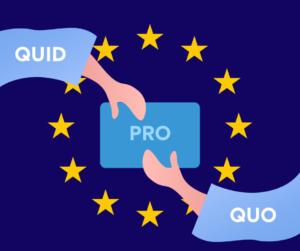Headquarters: Svetog Nauma 7, 11000
Office address: Đorđa Vajferta 13, 11000
Phone:: +381 11 4529 323

In addition to the war in Ukraine, the conflict in Gaza represents the greatest foreign policy challenge for the EU. After lengthy negotiations and more than a year and a half without a clear position on the matter, a new phase of thinking has begun to emerge within the EU. When the news was flooded with images of the horrors caused by the mass killing of civilians in Gaza, not only did Member States such as Spain, Ireland and Slovenia decide to recognise Palestine and call for an end to the genocide, but pressure also mounted on the EU as a whole to take joint, concrete measures against Israel, all with the aim of achieving a ceasefire. Thus, on 15 July 2025, discussions were held on reviewing the EU–Israel Association Agreement (AA), citing long-standing concerns over Israel’s attacks and the blockade of humanitarian aid to Gaza. In order to assess the realistic prospects for its suspension in the foreseeable future, the following section analyses the content of the agreement, the mechanisms enabling its freezing, and the obstacles standing in the way of such a decision.
One of the EU’s most powerful foreign policy instruments is the AA itself. When Serbia signed such an agreement with the EU – along with the other Western Balkan states – it marked a new stage in their mutual relations, enabling the deepening of economic and political ties. The EU and Israel, however, had signed such an agreement long before this region, back in 1995, with it entering into force five years later. This document provides the legal framework governing political, economic and trade relations, with particular emphasis on reducing most tariffs, opening markets, and including Israel in various EU programmes. A key provision is Article 2, which states: “Relations between the Parties, as well as all the provisions of the AA itself, shall be based on respect for human rights and democratic principles, which guides their internal and international policy and constitutes an essential element of this Agreement.” It is precisely this wording that is most frequently cited today in the context of debates on a possible suspension of the Agreement.
It is no surprise that the initiative to suspend the AA originated in the Netherlands – a country that has built a European, and indeed global, reputation not only for its impeccable record on the rule of law, but also for placing particular emphasis on criminal accountability for war crimes. This region knows the Netherlands well as the seat of the International Criminal Tribunal for the former Yugoslavia, the International Court of Justice, and the Permanent Court of Arbitration in The Hague. With such a national “résumé”, the issue of preventing further war crimes in Gaza reached the EU agenda after the Dutch Minister of Foreign Affairs sent a letter on 6 May 2025 to the High Representative for Foreign Affairs and Security Policy, Kaja Kallas. In it, he called for a review of the AA under Article 2, as it obliges the parties to respect human rights and democratic principles. In the meantime, the Netherlands has stated that, until the investigation is concluded, it will not support the renewal of the EU–Israel three-year Action Plan – a move that will block any further deepening of relations. Such actions compel all Member States to take a clear and unequivocal stance on an issue that will, in the long term, shape the credibility and direction of European foreign policy.
The fact that the Netherlands – a country that has traditionally maintained good relations with Israel – raised the question of suspending the AA triggered a wave of reactions across Europe. It therefore comes as no surprise that High Representative Kallas, two weeks after the Dutch request, formally launched a review procedure to assess Israel’s compliance with human rights and democratic principles – the first step in a process that could ultimately lead to the suspension of the AA. Countries such as France, Belgium and Ireland joined the call for a review, arguing that Israel’s plans for the long-term occupation of Gaza threaten the prospects of a peace process. In total, 17 Member States openly supported the Dutch request. On the other hand, Member States such as Hungary and Austria categorically reject any possibility of suspending the AA, insisting on the continuation of dialogue and cooperation. These countries warn that sanctions would be counterproductive and would further distance the parties from a peace settlement. Such divisions make decision-making even more difficult, given that the suspension of the AA requires unanimous approval from EU Member States.
A full suspension of the AA remains the ultimate, “nuclear” option, and the EU Council could instead decide to halt cooperation in certain areas. On 17 July 2025, High Representative Kallas presented no fewer than nine options – with the suspension of the AA as the tenth – among them the suspension of political dialogue and the termination of visa-free travel. While member states deliberate, on 28 July 2025, the Commission proposed the partial suspension of Israel’s participation in the “Horizon Europe” programme, targeting start-ups and small enterprises with disruptive innovations and new technologies with potential dual-use applications, such as those in the fields of cyber security, drones and artificial intelligence. The proposed suspension is a targeted measure intended to discourage further attacks on Gaza and would thus not affect the participation of Israeli universities and researchers in collaborative projects and research activities under the programme. For the Commission’s proposal to be adopted, it must secure the support of a qualified majority in the Council. As the conflict continues to escalate, the coming months will bring an even more intense debate within the EU, pitting those calling for a more decisive response against those advocating a gradual, dialogue-based approach.
Originally posted on EUpravozato.